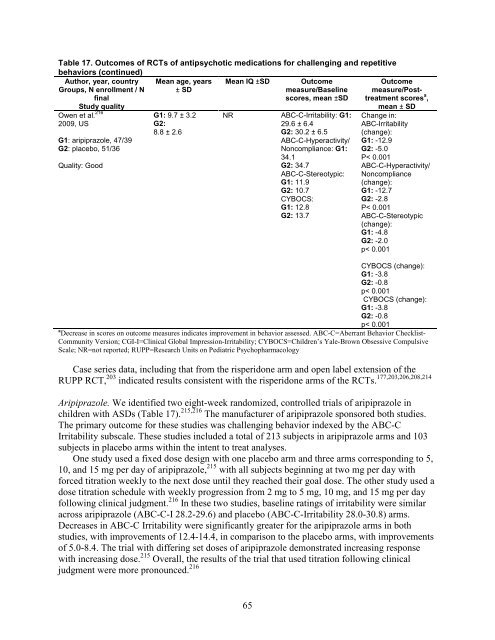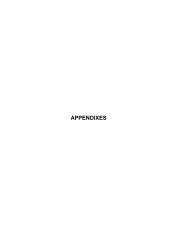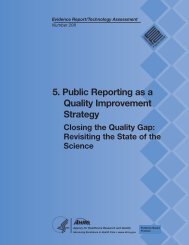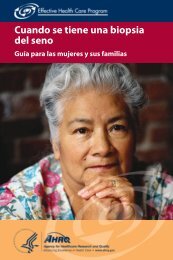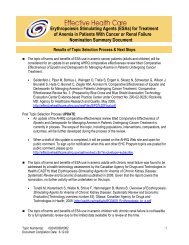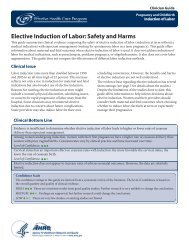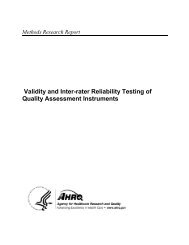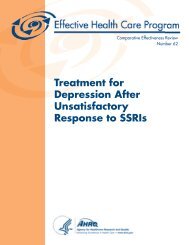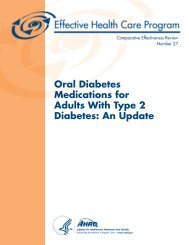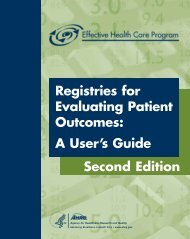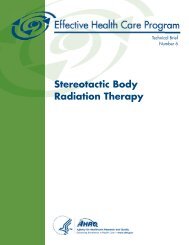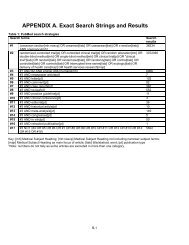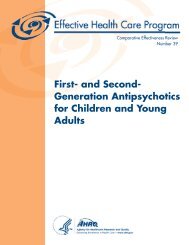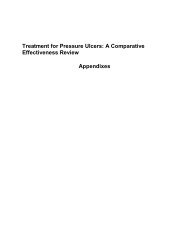- Page 1 and 2:
Comparative Effectiveness Review Nu
- Page 3 and 4:
This report is based on research co
- Page 5 and 6:
Acknowledgments We are indebted to
- Page 7 and 8:
Therapies for Children With Autism
- Page 9 and 10:
Dietary and Other Medical Intervent
- Page 11 and 12:
Figures Figure A. Analytic framewor
- Page 13 and 14:
Table A. Description of interventio
- Page 15 and 16:
Analytic Framework Figure A. Analyt
- Page 17 and 18:
Strength of evidence. The degree of
- Page 19 and 20:
epetitive behavior showed improveme
- Page 21 and 22:
subgroups of children, although the
- Page 23 and 24:
We encourage investigators to provi
- Page 25 and 26:
9. Remington B, Hastings RP, Kovsho
- Page 27 and 28:
46. Green J, Charman T, McConachie
- Page 29 and 30:
82. Reaven JA, Blakeley-Smith A, Ni
- Page 31 and 32:
120. Masi G, Cosenza A, Mucci M, et
- Page 33 and 34:
157. Evangeliou A, Vlachonikolis I,
- Page 35 and 36:
Introduction Need for Evidence for
- Page 37 and 38:
Interventions intended primarily to
- Page 39 and 40:
Table 1. Description of behavioral
- Page 41 and 42:
Serotonin reuptake inhibitors. Sero
- Page 43 and 44:
Table 3. Description of medical and
- Page 45 and 46:
Table 4. Description of allied heal
- Page 47 and 48: Key Questions and Analytic Framewor
- Page 49 and 50: Chapter 4 discusses the results in
- Page 51 and 52: Methods This chapter documents proc
- Page 53 and 54: • Did not present aggregated resu
- Page 55 and 56: Additional behavioral interventions
- Page 57 and 58: 1. Did the study employ a group des
- Page 59 and 60: Scoring: Studies minimally had to h
- Page 61 and 62: These ratings of applicability do n
- Page 63 and 64: Figure 2. Disposition of articles a
- Page 65 and 66: • ABA-based approaches including
- Page 67 and 68: education, children in the intensiv
- Page 69 and 70: abilities. This finding is further
- Page 71 and 72: Table 10. Outcomes of early intensi
- Page 73 and 74: forecast behavior; perspective taki
- Page 75 and 76: interaction with peers; outcome mea
- Page 77 and 78: hyperactivity, inattention, challen
- Page 79 and 80: Table 12. Outcomes of RCTs assessin
- Page 81 and 82: Schedule for Affective Disorders an
- Page 83 and 84: SCAS-P=Spence Child Anxiety Scale-P
- Page 85 and 86: Summary of the literature. Jarusiew
- Page 87 and 88: Table 14. Overview of educational s
- Page 89 and 90: on the Ankara Developmental Screeni
- Page 91 and 92: Checklist scores decreased by 8.4 f
- Page 93 and 94: Table 15. Outcomes of studies asses
- Page 95 and 96: evaluated the effects of risperidon
- Page 97: that this somnolence improved over
- Page 101 and 102: Serotonin Reuptake Inhibitors SRIs
- Page 103 and 104: One prospective case series of esci
- Page 105 and 106: Most participants were recruited fr
- Page 107 and 108: Dietary and Other Medical Intervent
- Page 109 and 110: Summary of the literature-other int
- Page 111 and 112: withdrew after the first six weeks;
- Page 113 and 114: therefore described separately belo
- Page 115 and 116: addressed, 85 typically involves on
- Page 117 and 118: In the second paper, 89 treatment s
- Page 119 and 120: Table 25. Overview of CAM studies a
- Page 121 and 122: Teacher and Parent Scales, behavior
- Page 123 and 124: Because of the potentially increase
- Page 125 and 126: Educational Interventions Child cha
- Page 127 and 128: showed diminished response to escit
- Page 129 and 130: oom as the other assessments, so it
- Page 131 and 132: contrast group (n=18) on three meas
- Page 133 and 134: and are based on consideration of f
- Page 135 and 136: Few studies directly comparing the
- Page 137 and 138: Strength of evidence. The strength
- Page 139 and 140: While individual studies of CBT and
- Page 141 and 142: Table 32. Summary of results of edu
- Page 143 and 144: Table 33. Summary of results of med
- Page 145 and 146: strength of this reviewed literatur
- Page 147 and 148: Table 36. Intervention, strength of
- Page 149 and 150:
Table 37. Interventions/outcomes wi
- Page 151 and 152:
gains. 104 Other studies have seen
- Page 153 and 154:
percent of behavioral studies repor
- Page 155 and 156:
limited followup, lack of comparati
- Page 157 and 158:
individual intervention is warrante
- Page 159 and 160:
selecting participants for their st
- Page 161 and 162:
studies lacked an arm that consider
- Page 163 and 164:
23. Kanner L. Autistic Disturbances
- Page 165 and 166:
62. Dosman CF, Drmic IE, Brian JA,
- Page 167 and 168:
104. Ben-Itzchak E and Zachor DA. T
- Page 169 and 170:
142. Tyminski RF and Moore PJ. The
- Page 171 and 172:
177. Aman MG, McDougle CJ, Scahill
- Page 173 and 174:
214. Correia CT, Almeida JP, Santos
- Page 175 and 176:
252. Akhondzadeh S, Tajdar H, Moham
- Page 177 and 178:
290. Dawson G, Rogers S, Munson J,
- Page 179 and 180:
Acronyms/Abbreviations ABA Applied
- Page 181 and 182:
Appendix A. Exact Search Strings an
- Page 183 and 184:
Table A2. PsycINFO search strategie
- Page 185 and 186:
Therapies for Children with Autism
- Page 187 and 188:
Therapies for Children with ASD Sys
- Page 189 and 190:
Appendix C. Evidence Tables Tables
- Page 191 and 192:
Evidence Table. Therapies for child
- Page 193 and 194:
Evidence Table. Therapies for child
- Page 195 and 196:
Evidence Table. Therapies for child
- Page 197 and 198:
Evidence Table. Therapies for child
- Page 199 and 200:
Evidence Table. Therapies for child
- Page 201 and 202:
Evidence Table. Therapies for child
- Page 203 and 204:
Evidence Table. Therapies for child
- Page 205 and 206:
Evidence Table. Therapies for child
- Page 207 and 208:
Evidence Table. Therapies for child
- Page 209 and 210:
Evidence Table. Therapies for child
- Page 211 and 212:
Evidence Table. Therapies for child
- Page 213 and 214:
Evidence Table. Therapies for child
- Page 215 and 216:
Evidence Table. Therapies for child
- Page 217 and 218:
Evidence Table. Therapies for child
- Page 219 and 220:
Evidence Table. Therapies for child
- Page 221 and 222:
Evidence Table. Therapies for child
- Page 223 and 224:
Evidence Table. Therapies for child
- Page 225 and 226:
Evidence Table. Therapies for child
- Page 227 and 228:
Evidence Table. Therapies for child
- Page 229 and 230:
Evidence Table. Therapies for child
- Page 231 and 232:
Evidence Table. Therapies for child
- Page 233 and 234:
Evidence Table. Therapies for child
- Page 235 and 236:
Evidence Table. Therapies for child
- Page 237 and 238:
Evidence Table. Therapies for child
- Page 239 and 240:
Evidence Table. Therapies for child
- Page 241 and 242:
Evidence Table. Therapies for child
- Page 243 and 244:
Evidence Table. Therapies for child
- Page 245 and 246:
Evidence Table. Therapies for child
- Page 247 and 248:
Evidence Table. Therapies for child
- Page 249 and 250:
Evidence Table. Therapies for child
- Page 251 and 252:
Evidence Table. Therapies for child
- Page 253 and 254:
Evidence Table. Therapies for child
- Page 255 and 256:
Evidence Table. Therapies for child
- Page 257 and 258:
Evidence Table. Therapies for child
- Page 259 and 260:
Evidence Table. Therapies for child
- Page 261 and 262:
Evidence Table. Therapies for child
- Page 263 and 264:
Evidence Table. Therapies for child
- Page 265 and 266:
Evidence Table. Therapies for child
- Page 267 and 268:
Evidence Table. Therapies for child
- Page 269 and 270:
Evidence Table. Therapies for child
- Page 271 and 272:
Evidence Table. Therapies for child
- Page 273 and 274:
Evidence Table. Therapies for child
- Page 275 and 276:
Evidence Table. Therapies for child
- Page 277 and 278:
Evidence Table. Therapies for child
- Page 279 and 280:
Evidence Table. Therapies for child
- Page 281 and 282:
Evidence Table. Therapies for child
- Page 283 and 284:
Evidence Table. Therapies for child
- Page 285 and 286:
Evidence Table. Therapies for child
- Page 287 and 288:
Evidence Table. Therapies for child
- Page 289 and 290:
Evidence Table. Therapies for child
- Page 291 and 292:
Evidence Table. Therapies for child
- Page 293 and 294:
Evidence Table. Therapies for child
- Page 295 and 296:
Evidence Table. Therapies for child
- Page 297 and 298:
Evidence Table. Therapies for child
- Page 299 and 300:
Evidence Table. Therapies for child
- Page 301 and 302:
Evidence Table. Therapies for child
- Page 303 and 304:
Evidence Table. Therapies for child
- Page 305 and 306:
Evidence Table. Therapies for child
- Page 307 and 308:
Evidence Table. Therapies for child
- Page 309 and 310:
Evidence Table. Therapies for child
- Page 311 and 312:
Evidence Table. Therapies for child
- Page 313 and 314:
Evidence Table. Therapies for child
- Page 315 and 316:
Evidence Table. Therapies for child
- Page 317 and 318:
Evidence Table. Therapies for child
- Page 319 and 320:
Evidence Table. Therapies for child
- Page 321 and 322:
Evidence Table. Therapies for child
- Page 323 and 324:
Evidence Table. Therapies for child
- Page 325 and 326:
Evidence Table. Therapies for child
- Page 327 and 328:
Evidence Table. Therapies for child
- Page 329 and 330:
Evidence Table. Therapies for child
- Page 331 and 332:
Evidence Table. Therapies for child
- Page 333 and 334:
Evidence Table. Therapies for child
- Page 335 and 336:
Evidence Table. Therapies for child
- Page 337 and 338:
Evidence Table. Therapies for child
- Page 339 and 340:
Evidence Table. Therapies for child
- Page 341 and 342:
Evidence Table. Therapies for child
- Page 343 and 344:
Evidence Table. Therapies for child
- Page 345 and 346:
Evidence Table. Therapies for child
- Page 347 and 348:
Evidence Table. Therapies for child
- Page 349 and 350:
Evidence Table. Therapies for child
- Page 351 and 352:
Evidence Table. Therapies for child
- Page 353 and 354:
Evidence Table. Therapies for child
- Page 355 and 356:
Evidence Table. Therapies for child
- Page 357 and 358:
Evidence Table. Therapies for child
- Page 359 and 360:
Evidence Table. Therapies for child
- Page 361 and 362:
Evidence Table. Therapies for child
- Page 363 and 364:
Evidence Table. Therapies for child
- Page 365 and 366:
Evidence Table. Therapies for child
- Page 367 and 368:
Evidence Table. Therapies for child
- Page 369 and 370:
Evidence Table. Therapies for child
- Page 371 and 372:
Evidence Table. Therapies for child
- Page 373 and 374:
Evidence Table. Therapies for child
- Page 375 and 376:
Evidence Table. Therapies for child
- Page 377 and 378:
Evidence Table. Therapies for child
- Page 379 and 380:
Evidence Table. Therapies for child
- Page 381 and 382:
Evidence Table. Therapies for child
- Page 383 and 384:
Evidence Table. Therapies for child
- Page 385 and 386:
Evidence Table. Therapies for child
- Page 387 and 388:
Evidence Table. Therapies for child
- Page 389 and 390:
Evidence Table. Therapies for child
- Page 391 and 392:
Evidence Table. Therapies for child
- Page 393 and 394:
Evidence Table. Therapies for child
- Page 395 and 396:
Evidence Table. Therapies for child
- Page 397 and 398:
Evidence Table. Therapies for child
- Page 399 and 400:
Evidence Table. Therapies for child
- Page 401 and 402:
Evidence Table. Therapies for child
- Page 403 and 404:
Evidence Table. Therapies for child
- Page 405 and 406:
Evidence Table. Therapies for child
- Page 407 and 408:
Evidence Table. Therapies for child
- Page 409 and 410:
Evidence Table. Therapies for child
- Page 411 and 412:
Evidence Table. Therapies for child
- Page 413 and 414:
Evidence Table. Therapies for child
- Page 415 and 416:
Evidence Table. Therapies for child
- Page 417 and 418:
Evidence Table. Therapies for child
- Page 419 and 420:
Evidence Table. Therapies for child
- Page 421 and 422:
Evidence Table. Therapies for child
- Page 423 and 424:
Evidence Table. Therapies for child
- Page 425 and 426:
Evidence Table. Therapies for child
- Page 427 and 428:
Evidence Table. Therapies for child
- Page 429 and 430:
Evidence Table. Therapies for child
- Page 431 and 432:
Evidence Table. Therapies for child
- Page 433 and 434:
Evidence Table. Therapies for child
- Page 435 and 436:
Evidence Table. Therapies for child
- Page 437 and 438:
Evidence Table. Therapies for child
- Page 439 and 440:
Evidence Table. Therapies for child
- Page 441 and 442:
Evidence Table. Therapies for child
- Page 443 and 444:
Evidence Table. Therapies for child
- Page 445 and 446:
Evidence Table. Therapies for child
- Page 447 and 448:
Evidence Table. Therapies for child
- Page 449 and 450:
Evidence Table. Therapies for child
- Page 451 and 452:
Evidence Table. Therapies for child
- Page 453 and 454:
Evidence Table. Therapies for child
- Page 455 and 456:
Evidence Table. Therapies for child
- Page 457 and 458:
Evidence Table. Therapies for child
- Page 459 and 460:
Evidence Table. Therapies for child
- Page 461 and 462:
Evidence Table. Therapies for child
- Page 463 and 464:
Evidence Table. Therapies for child
- Page 465 and 466:
Evidence Table. Therapies for child
- Page 467 and 468:
Evidence Table. Therapies for child
- Page 469 and 470:
Evidence Table. Therapies for child
- Page 471 and 472:
Evidence Table. Therapies for child
- Page 473 and 474:
Evidence Table. Therapies for child
- Page 475 and 476:
Evidence Table. Therapies for child
- Page 477 and 478:
Evidence Table. Therapies for child
- Page 479 and 480:
Evidence Table. Therapies for child
- Page 481 and 482:
Evidence Table. Therapies for child
- Page 483 and 484:
Evidence Table. Therapies for child
- Page 485 and 486:
Evidence Table. Therapies for child
- Page 487 and 488:
Evidence Table. Therapies for child
- Page 489 and 490:
Evidence Table. Therapies for child
- Page 491 and 492:
Evidence Table. Therapies for child
- Page 493 and 494:
Evidence Table. Therapies for child
- Page 495 and 496:
Evidence Table. Therapies for child
- Page 497 and 498:
Evidence Table. Therapies for child
- Page 499 and 500:
Evidence Table. Therapies for child
- Page 501 and 502:
Evidence Table. Therapies for child
- Page 503 and 504:
Evidence Table. Therapies for child
- Page 505 and 506:
Evidence Table. Therapies for child
- Page 507 and 508:
Evidence Table. Therapies for child
- Page 509 and 510:
Evidence Table. Therapies for child
- Page 511 and 512:
Evidence Table. Therapies for child
- Page 513 and 514:
Evidence Table. Therapies for child
- Page 515 and 516:
Evidence Table. Therapies for child
- Page 517 and 518:
Evidence Table. Therapies for child
- Page 519 and 520:
Evidence Table. Therapies for child
- Page 521 and 522:
Evidence Table. Therapies for child
- Page 523 and 524:
Evidence Table. Therapies for child
- Page 525 and 526:
Evidence Table. Therapies for child
- Page 527 and 528:
Evidence Table. Therapies for child
- Page 529 and 530:
Evidence Table. Therapies for child
- Page 531 and 532:
Evidence Table. Therapies for child
- Page 533 and 534:
Evidence Table. Therapies for child
- Page 535 and 536:
Evidence Table. Therapies for child
- Page 537 and 538:
Evidence Table. Therapies for child
- Page 539 and 540:
Evidence Table. Therapies for child
- Page 541 and 542:
Evidence Table. Therapies for child
- Page 543 and 544:
Evidence Table. Therapies for child
- Page 545 and 546:
Evidence Table. Therapies for child
- Page 547 and 548:
Evidence Table. Therapies for child
- Page 549 and 550:
Evidence Table. Therapies for child
- Page 551 and 552:
Evidence Table. Therapies for child
- Page 553 and 554:
Evidence Table. Therapies for child
- Page 555 and 556:
Evidence Table. Therapies for child
- Page 557 and 558:
Evidence Table. Therapies for child
- Page 559 and 560:
Evidence Table. Therapies for child
- Page 561 and 562:
Evidence Table. Therapies for child
- Page 563 and 564:
Evidence Table. Therapies for child
- Page 565 and 566:
Evidence Table. Therapies for child
- Page 567 and 568:
Evidence Table. Therapies for child
- Page 569 and 570:
Evidence Table. Therapies for child
- Page 571 and 572:
Evidence Table. Therapies for child
- Page 573 and 574:
Evidence Table. Therapies for child
- Page 575 and 576:
Evidence Table. Therapies for child
- Page 577 and 578:
Evidence Table. Therapies for child
- Page 579 and 580:
Evidence Table. Therapies for child
- Page 581 and 582:
Evidence Table. Therapies for child
- Page 583 and 584:
Evidence Table. Therapies for child
- Page 585 and 586:
Evidence Table. Therapies for child
- Page 587 and 588:
Evidence Table. Therapies for child
- Page 589 and 590:
Evidence Table. Therapies for child
- Page 591 and 592:
Evidence Table. Therapies for child
- Page 593 and 594:
Evidence Table. Therapies for child
- Page 595 and 596:
Evidence Table. Therapies for child
- Page 597 and 598:
Country: US Practice setting: Clini
- Page 599 and 600:
Dunn-Geier et al., 2000 (continued)
- Page 601 and 602:
Evidence Table: Therapies for Child
- Page 603 and 604:
Evidence Table: Therapies for Child
- Page 605 and 606:
Evidence Table: Therapies for Child
- Page 607 and 608:
Appendix D. List of Excluded Studie
- Page 609 and 610:
31. Aarsland D, Cummings JL and Lar
- Page 611 and 612:
59. Ahearn WH, Clark KM, Gardenier
- Page 613 and 614:
89. Allison DB, Basile VC and MacDo
- Page 615 and 616:
118. Ando H, Yoshimura I and Wakaba
- Page 617 and 618:
146. Atkinson RP, Jenson WR, Rovner
- Page 619 and 620:
177. Bakare MO, Agomoh AO, Ebigbo P
- Page 621 and 622:
204. Baron-Cohen S, Scott FJ, Allis
- Page 623 and 624:
233. Bebko JM, Perry A and Bryson S
- Page 625 and 626:
262. Bergmann F, Stepp H, Metzger R
- Page 627 and 628:
291. Birkan B, McClannahan LE and K
- Page 629 and 630:
319. Boddy F, Rowan EN, Lett D, et
- Page 631 and 632:
348. Bouma R and Schweitzer R. The
- Page 633 and 634:
376. Broadstock M, Doughty C and Eg
- Page 635 and 636:
404. Brudnak MA. Application of gen
- Page 637 and 638:
432. Buitelaar JK. Why have drug tr
- Page 639 and 640:
460. Butler DE, Nordin IC, L’Ital
- Page 641 and 642:
489. Campbell M, Locascio JJ, Choro
- Page 643 and 644:
517. Caronna EB, Augustyn M and Zuc
- Page 645 and 646:
546. Case-Smith J and Miller H. Occ
- Page 647 and 648:
574. Charlop MH, Burgio LD, Iwata B
- Page 649 and 650:
602. Cheng CW, Cho SH, Taylor M, et
- Page 651 and 652:
631. Cicero FR and Pfadt A. Investi
- Page 653 and 654:
662. Collier D and Reid G. A compar
- Page 655 and 656:
691. Coskun M, Karakoc S, Kircelli
- Page 657 and 658:
718. Cullen LA, Barlow JH and Cushw
- Page 659 and 660:
748. Davidovitch M, Holtzman G and
- Page 661 and 662:
777. DeLeon IG, Fisher WW and Marhe
- Page 663 and 664:
805. Devlin SD, Harber MM. Collabor
- Page 665 and 666:
834. Doherty K, Fitzgerald M and Ma
- Page 667 and 668:
863. Dudley LL, Johnson C and Barne
- Page 669 and 670:
893. Dybvik AC. Autism and the Incl
- Page 671 and 672:
924. Elder JH. In-home communicatio
- Page 673 and 674:
953. Erickson CA, Posey DJ, Stigler
- Page 675 and 676:
979. Faja S, Aylward E, Bernier R,
- Page 677 and 678:
1008. Ferri R, Elia M, Agarwal N, e
- Page 679 and 680:
1037. Fisher W, Kerbeshian J and Bu
- Page 681 and 682:
1066. Fragala-Pinkham M, Haley SM a
- Page 683 and 684:
1095. Furneaux B. Keeping the balan
- Page 685 and 686:
1124. Garcaa-Villamisar D, Wehman P
- Page 687 and 688:
1152. Ghezzi PM. Discrete Trials Te
- Page 689 and 690:
1180. Goin-Kochel RP, Myers BJ and
- Page 691 and 692:
1210. Gordon R, Handleman JS and Ha
- Page 693 and 694:
1239. Grimaldi BL. The central role
- Page 695 and 696:
1268. Guptill JT, Booker AB, Gibbs
- Page 697 and 698:
1296. Hamdan-Allen G. Brief report:
- Page 699 and 700:
1324. Hare DJ, Jones JPR and Paine
- Page 701 and 702:
1356. Harrison S and Berry L. Valui
- Page 703 and 704:
1386. Heilbrun AB, Jr., Blum N and
- Page 705 and 706:
1414. Hetzroni OE and Shalem U. Fro
- Page 707 and 708:
1443. Holburn CS. Counter the mistr
- Page 709 and 710:
1473. Horner RH, Carr EG, Strain PS
- Page 711 and 712:
1504. Hughes C, Soares-Boucaud I, H
- Page 713 and 714:
1533. Ijichi S and Ijichi N. Beyond
- Page 715 and 716:
1562. James SJ, Cutler P, Melnyk S,
- Page 717 and 718:
1591. Johnson CR, Butter EM, Handen
- Page 719 and 720:
1619. Joyce PR. The medical model-w
- Page 721 and 722:
1647. Karmali I, Greer RD, Nuzzolo-
- Page 723 and 724:
1673. Kelly AB, Garnett MS, Attwood
- Page 725 and 726:
1702. Kielinen M, Linna SL and Moil
- Page 727 and 728:
1731. Klin A, Lin DJ, Gorrindo P, e
- Page 729 and 730:
1761. Koegel RL and Frea WD. Treatm
- Page 731 and 732:
1790. Kolmen BK, Feldman HM, Handen
- Page 733 and 734:
1819. Kratochvil CJ, Findling RL, M
- Page 735 and 736:
1846. Lam MK and Rao N. Developing
- Page 737 and 738:
1874. Lattimore LP, Parsons MB and
- Page 739 and 740:
1903. Lee PC. Verification of a sim
- Page 741 and 742:
1932. Lerman DC, Vorndran C, Addiso
- Page 743 and 744:
1960. Licciardello CC, Harchik AE a
- Page 745 and 746:
1989. Liptak GS, Orlando M, Yinglin
- Page 747 and 748:
2015. Lorimer PA, Simpson RL, Myles
- Page 749 and 750:
2043. Luiselli JK, Kane A, Treml T,
- Page 751 and 752:
2071. MacFarlane JR and Kanaya T. W
- Page 753 and 754:
2099. Malone RP, Maislin G, Choudhu
- Page 755 and 756:
2127. Marin FZ. CAM versus nucleopl
- Page 757 and 758:
2157. Martineau J, Roux S, Adrien J
- Page 759 and 760:
2185. Matson JL and Lo Vullo SV. A
- Page 761 and 762:
2213. McCabe H. The Importance of P
- Page 763 and 764:
2240. McDougle CJ, Holmes JP, Carls
- Page 765 and 766:
2267. McHale SM, Olley JG, Marcus L
- Page 767 and 768:
2296. Merlo LJ, Lehmkuhl HD, Geffke
- Page 769 and 770:
2325. Minderaa RB, Anderson GM, Vol
- Page 771 and 772:
2354. Montgomery JM, Duncan CR and
- Page 773 and 774:
2385. Morrison RS, Sainato DM, Benc
- Page 775 and 776:
2413. Munesue T, Ono Y, Mutoh K, et
- Page 777 and 778:
2445. Napolitano DA, Tessing JL, Mc
- Page 779 and 780:
2474. Niederhofer H and Pittschiele
- Page 781 and 782:
2501. Nwora AJ and Gee BM. A case s
- Page 783 and 784:
2530. Olive ML, Lang RB and Davis T
- Page 785 and 786:
2559. Owens JA, Rosen CL and Mindel
- Page 787 and 788:
2589. Pansegrouw I and Alant E. Com
- Page 789 and 790:
2618. Paul C, Williams KE, Riegel K
- Page 791 and 792:
2646. Perry R, Nobler MS and Campbe
- Page 793 and 794:
2675. Piazza CC, Hagopian LP, Hughe
- Page 795 and 796:
2704. Poon L, Partika N and Bolman
- Page 797 and 798:
2734. Prizant BM. Speech-language p
- Page 799 and 800:
2764. Rapp JT, Vollmer TR, St. Pete
- Page 801 and 802:
2792. Reed P, Broomfield L, McHugh
- Page 803 and 804:
2819. Remington G, Sloman L, Konsta
- Page 805 and 806:
2849. Ringdahl JE, Kitsukawa K, And
- Page 807 and 808:
2877. Rogers SJ. Interventions that
- Page 809 and 810:
2908. Rossignol DA. Novel and emerg
- Page 811 and 812:
2939. Rutter M, Kreppner J, Croft C
- Page 813 and 814:
2967. Sandt D. Social Stories for S
- Page 815 and 816:
2994. Scanlon K. Art therapy with a
- Page 817 and 818:
3023. Schneider CK, Melmed RD, Bars
- Page 819 and 820:
3054. Schwartz IS, Sandall SR, Garf
- Page 821 and 822:
3085. Shafer MS, Egel AL and Neef N
- Page 823 and 824:
3115. Shipley-Benamou R, Lutzker JR
- Page 825 and 826:
3143. Siller M and Sigman M. The be
- Page 827 and 828:
3173. Smith C, Felce D, Jones E, et
- Page 829 and 830:
3202. Snyder A, Bossomaier T and Mi
- Page 831 and 832:
3230. Spero MH. The emancipation of
- Page 833 and 834:
3259. Stephens CE. Spontaneous imit
- Page 835 and 836:
3289. Strambi M, Longini M, Hayek J
- Page 837 and 838:
3318. Suzumura K. How an autistic b
- Page 839 and 840:
3346. Tager-Flusberg H and Calkins
- Page 841 and 842:
3376. Taylor I, O’Reilly M and La
- Page 843 and 844:
3407. Thunberg G, Ahlsen E and Sand
- Page 845 and 846:
3435. Trembath D, Balandin S, Toghe
- Page 847 and 848:
3464. Turner-Brown LM, Perry TD, Di
- Page 849 and 850:
3492. Van Der Putt R, Dineen C, Jan
- Page 851 and 852:
3522. Vitiello B. Recent NIMH clini
- Page 853 and 854:
3553. Walenski M, Mostofsky SH, Gid
- Page 855 and 856:
3581. Weber RC and Thorpe J. Teachi
- Page 857 and 858:
3610. Wheeler JJ, Baggett BA, Fox J
- Page 859 and 860:
3637. Williams B. Mental handicap n
- Page 861 and 862:
3669. Wimpory D, Chadwick P and Nas
- Page 863 and 864:
3698. Worth S and Reynolds S. The A
- Page 865 and 866:
3728. Young JM, Krantz PJ, McClanna
- Page 867 and 868:
3759. Zuddas A, Di Martino A, Mugli
- Page 869 and 870:
Appendix F. Approach to Categorizin
- Page 871 and 872:
APPENDIX G. Discussion of Recent Sy
- Page 873 and 874:
one a casein free regime. Diets wer
- Page 875 and 876:
outcome data as Type 6, defined as
- Page 877 and 878:
Yes—no disclosures to make G7 Bai
- Page 879 and 880:
Table G1. Characteristics of recent
- Page 881 and 882:
Random assignment Appropriate compa
- Page 883 and 884:
Random assignment Appropriate compa
- Page 885 and 886:
Random assignment Appropriate compa
- Page 887 and 888:
Random assignment Appropriate compa
- Page 889 and 890:
Random assignment Appropriate compa
- Page 891 and 892:
Random assignment Appropriate compa
- Page 893 and 894:
Study Group design Random assignmen
- Page 895 and 896:
Random assignment Appropriate compa
- Page 897 and 898:
Random assignment Appropriate compa
- Page 899 and 900:
Random assignment Appropriate compa
- Page 901 and 902:
Random assignment Appropriate compa
- Page 903 and 904:
Random assignment Appropriate compa
- Page 905 and 906:
APPENDIX I. Applicability Summary T
- Page 907 and 908:
Social skills (continued) Domain De


